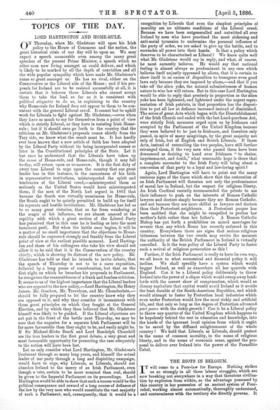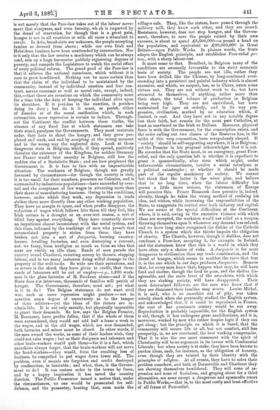THE RIOTS IN BELGIUM.
IT will come to a Poor-law for Europe. Nothing strikes us so strongly in all these labour struggles, which are now breaking out everywhere in a way that threatens civilisa- tion by explosion from within, as the advantage possessed by this country in her possession of an ancient system of Poor- relief, working almost automatically, thoroughly understood, and conterminous with the territory she directly governs. It is not merely that the Poor-law takes out of the labour move- ment that sharpness, and even ferocity, wh ch is imparted by the dread of starvation, for though that is a great gain, hunger is not in all countries or with all races a stimulant to revolt. In Asia, bread-riots are unknown, the people accepting famine as decreed from above; while our own Irish and Hebridean famines have been unattended by insurrection. Nor is it only that the law creates a machinery which can be always used, sets up a huge barometer publicly registering degrees of poverty, and compels the Legislature to watch the social effect of every political reform. The grand good of the Poor-law is that it relieves the national conscience, which without it is sure to grow bewildered. Nothing can be more certain than that the claim of the individual to be maintained by the community, instead of by individual exertion and free con- tract, means economic as well as moral ruin, except, indeed, this,—that there are occasions on which the community must for a time take the duty of keeping the individual alive upon its shoulders. If it perishes in the exertion, it perishes doing its duty ; but do it it must, or perish, either of disorder or of the moral ossification which, in such extremities, mere repression is certain to induce. Through- out the Continent the conflict between these truths, the absence of any fixed line at which statesmen can take their stand, paralyses the Governments. They must maintain order, they hate to shoot the hungry, and they grow per- plexed and weak, and end by accepting at the wrong moment and in the wrong way the neglected duty. Look at these dangerous riots in Belgium, which, if they spread, positively threaten the existence of the Kingdom, for neither Germany nor France would bear anarchy in Belgium, still less the sudden rise of a Socialistic State ; and see how perplexed the Government is. It is face to face with an impracticable situation. The workmen of Belgium, though not greatly favoured by circumstances—for though the country is rich, it is too small for their numbers, possesses no Colonies, and is surrounded by industrious populations—have succeeded by over- toil and the acceptance of low wages in attracting more than their share of manufacturing business. Owing to the conditions, however, under which they work, any depression in trade strikes them more directly than any other working population. They have no margin to spare, and when profits disappear, the reduction of wages which follows hits them till they feel, like Irish cottars in a drought or an over-wet season, a sort of blind fury against everything. They have constantly shown an impatience almost inconsistent with the social system, and this time, inflamed by the teachings of men who preach that accumulated property is stolen from them, they have broken out into a sort of Jacquerie, burning country- houses, levelling factories, and even destroying a convent, not, we fancy, from irreligion so much as from an idea that nuns are visibly an idle class. Bands of men parade the country round Charleroi, extorting money by threats, stopping labour, and in too many instances doing wilful damage to the property of the well-to-do. So wide are their operations, and so severe is the shock they have given to credit, that thou- sands of labourers will be out of employ—e.g., 1,200 work- men in the glass factories of M. Baudoux alone—and if the State does not intervene, thousands of families will perish of hunger. The Government, therefore, must act ; yet what is it to do ? The Belgian statesmen do not want civil war, such as mere repression might produce — not to mention some degree of uncertainty as to the temper of their soldiers—yet the ideas of the rioters are in- admis-ible. It is not only morally, but physically impossible to grant their demands. So low, says the Belgian Premier, M. Beernaert, have profits fallen, that if the whole of them were surrendered, they would not add half a franc a week to the wages, and at the old wages, which are now demanded, both factories and mines must be closed. In other words, if the men owned the works, as some of their leaders wish, they could not raise wages ; but as their designers and salesmen and other brain-workers would quit them—for it is a fact, which anarchists always forget, that the brain-workers will not serve the hand-workers—they would, from the resulting loss of business, be compelled to put wages down lower still. The problem, even if morals are forgotten and credit destroyed by confiscation, is insoluble ; and what, then, is the Govern- ment to do ? It can restore order in the towns by force, and by a happy inspiration it has saved the country districts. The Public Prosecutor issued a notice that, under the circumstances, no one would be prosecuted for self- defence, and the peasantry, hearing that, soon made the villages safe. They, like the rioters, have passed through the military mill, they know each other, and they are armed. Resistance, however, does not stop hunger, and the Govern- ment, therefore, to save the people ruined by their own excesses, is about to spend £3,600,000—a pound a head on the population, and equivalent to £30,000,000 in Great Britain—upon Public Works. In plainer words, the State adopts the English principle, and establishes Poor-relief pro tern., with a sharp labour-test.
It must come to that. Recollect, in Belgium many of the conditions are unusually favourable to the strict economic basis of society. The people are not idle, rather they have been drilled, like the Chinese, by long-continued over- crowding into a persistent and painful industry which is almost excessive, and which, we suspect, has, as in China, eaten some virtues out. They are not without work to do, but have attracted to themselves, if anything, rather more than their share, the total volume of production in Belgium befog very high. They are not uncivilised, but have maintained for ages an orderly, and in its way pro- gressive, civilisation, marked by an education which, if limited, is real. And they have not in any notable degree lost their faith, but remain for the most part Catholics, at least as convinced as the Irish or Italians. Moreover, physical force is with the Government, for the conscription exists, and the order calling out two classes of the Reserves has, in the midst of this very commotion, been scrupulously obeyed. If "society " should be self-supporting anywhere, it is in Belgium; yet the Premier in his proposal acknowledges that it is not. He concedes that the State must, in an emergency, grant Poor- relief, and the only question left is whether it is expedient to grant it spasmodically, after riots which might, under unfavourable circumstances, involve a social cataclysm or a political catastrophe ; or whether it should be made part of the regular machinery of society. We cannot but think that the latter is the wiser plan, and believe that in no long time, when the labour difficulty has grown a little more serious, the statesmen of Europe will perceive this. Prince Bismarck does perceive it, indeed, already, though he takes the wrong method of realising his idea, and wishes, while increasing the responsibilities of the State, to exaggerate its control over both industry and capital. We are aware of the special difficulties of the Continent, where, it is said, owing to the excessive violence with which ideas are accepted, the workmen would use relief as a weapon, throwing themselves upon it whenever any demand was refused, and we have long since recognised the dislike of the Catholic Church to a system which she thinks impairs the obligation of charity. The Church, however, though it dislikes, does not condemn a Poor-law, accepting it, for example, in Ireland, _ and the statesmen know that this is a world in which they have often only a choice of risks. A Jacquerie is far more dangerous to civilisation than any trade combination, and the dread of hunger, which seems to madden the races that fear it, is the one which in our days produces Jacqueries. Remove that, let every man know that, happen what may, he will have
food and shelter, though the food be poor, and the shelter dis- agreeable, and the main lever of the anarchists, with which they are shaking society, will have disappeared. Their most determined followers are the men who know that if they are dismissed their families may starve. Louise Michel. it is said, who is an anarchist out of pity, was taken utterly aback when she personally studied the English system, and acknowledged that, if it could be reproduced in France, the root of her passionate oratory would be cut away.
Reproduction is probably impossible, for the English system is old, though it has undergone great modifications, and it is, moreover, worked by men who rather despise logic if they can get along ; but the principle on which it is based, that the community will secure life to all, but not comfort, still less prosperity, is, we are convinced, the best working compromise.
That it is also the one most consonant with the spirit of Christianity will be no argument in its favour with Continental Liberals ; but when society is at stake, they have been known to pardon ideas, such, for instance, as the obligation of honesty, even though they are tainted by their identity with the principles of religion. At all events, they have to solve their problem somehow, and both at Decazeville and Charleroi they are showing themselves bewildered. They will none of re- pression and none of Socialism, and groping about for a third alternative, see none except a dangerous and spasmodic resort to Public Works,—that is, to the most costly and least effective of all forms of Poor-relief.



































 Previous page
Previous page